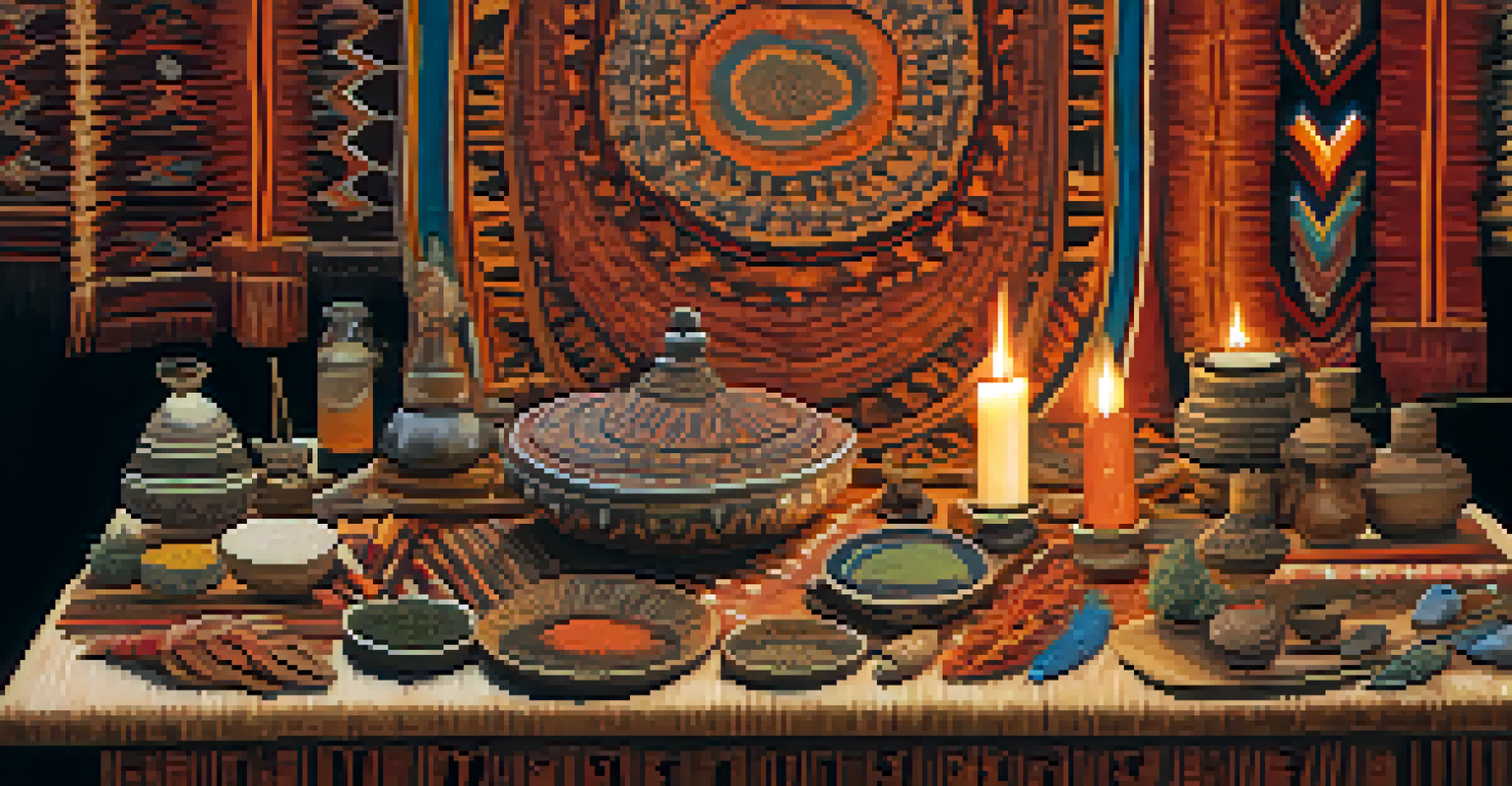Cultural Perspectives on Entheogens and Altered States

Understanding Entheogens: A Cultural Overview
Entheogens are substances that can induce altered states of consciousness, often used in spiritual or religious contexts. Different cultures have embraced these substances for centuries, viewing them as gateways to deeper understanding or connection with the divine. For example, Indigenous peoples in the Americas have historically used peyote and ayahuasca in their rituals, believing that these entheogens are sacred tools for healing and enlightenment.
The use of entheogens as a means to explore consciousness is a profound journey into the depths of human experience.
The cultural context in which these substances are used plays a crucial role in shaping perceptions and experiences. In many societies, entheogens are integrated into communal practices, turning the experience into a collective journey rather than an individual endeavor. By participating in these rituals, individuals often find a sense of belonging and shared purpose, enhancing the transformative power of the experience.
However, the Western perspective on entheogens often contrasts sharply with these traditional views. In modern times, they have been stigmatized and associated primarily with recreational drug use. This dichotomy highlights the importance of understanding the cultural nuances and historical significance behind entheogens to foster a more comprehensive dialogue about their potential benefits.
Historical Uses of Entheogens Across Cultures
Historically, entheogens have been used in various cultures for thousands of years, often linked to religious or spiritual practices. For instance, in ancient Greece, the Eleusinian Mysteries involved the consumption of a psychoactive brew believed to grant initiates profound insights. Such rituals illustrate how entheogens were viewed as essential tools for exploring existence's mysteries.

In Africa, the use of hallucinogenic plants like iboga in the Bwiti religion serves a similar purpose, allowing participants to connect with ancestral spirits. This practice exemplifies how different cultures have utilized entheogens to foster personal and communal transformation. Through these experiences, adherents often report healing from trauma and gaining clarity in their lives.
Entheogens: Cultural Significance
Entheogens have been used for centuries in various cultures as sacred tools for spiritual healing and community connection.
As we explore these historical contexts, it becomes clear that entheogens have served as more than just substances for altering perception. They have played significant roles in shaping cultural identity, community bonds, and personal growth, demonstrating their value across diverse societies.
Modern Scientific Perspectives on Entheogens
In recent years, the scientific community has begun to take a closer look at the effects of entheogens, leading to a resurgence of interest in their potential therapeutic benefits. Research has shown that substances like psilocybin and MDMA may help treat conditions such as PTSD, depression, and anxiety. This shift in perception marks a significant change from the stigma that once surrounded these compounds.
Ritual is not a thing of the past; it is a living tradition that connects us to our ancestors and to the divine.
Furthermore, studies often highlight the importance of set and setting—factors that can greatly influence the experience and its outcomes. A supportive environment combined with appropriate guidance can help users achieve deeper insights and healing. This understanding bridges the gap between traditional uses and modern therapeutic applications, emphasizing the need for respectful integration of these practices.
As scientists continue to investigate the benefits of entheogens, there’s a growing recognition of the wisdom embedded in cultural practices. By acknowledging the historical and spiritual contexts, researchers can develop protocols that respect traditional knowledge while exploring innovative therapeutic pathways.
The Role of Ritual in Altered States
Ritual plays a pivotal role in how entheogens are experienced across various cultures. For many, the ceremonial aspect of using these substances creates a sacred space, enhancing the overall experience. This structured approach often includes music, chanting, and communal participation, further deepening the connection to the experience.
In contrast, recreational use of entheogens tends to lack this ritualistic framework, which can lead to vastly different outcomes. Without the guidance of a ritual, individuals may not fully grasp the potential for introspection and healing that these substances can offer. This difference underscores the importance of context in shaping one’s experience with entheogens.
Modern Science Supports Benefits
Recent research highlights the therapeutic potential of entheogens, showing promise for treating mental health conditions like PTSD and anxiety.
Ritual also serves to connect individuals to their cultural heritage, reinforcing identity and community ties. As participants engage in these time-honored practices, they often report feelings of belonging and purpose, showcasing how rituals can transcend mere substance use and foster a profound sense of interconnectedness.
Cultural Appropriation and Entheogens
The increasing interest in entheogens within Western cultures raises important questions about cultural appropriation. As these substances gain popularity, it’s essential to consider their origins and the cultures that have historically utilized them. Misappropriating these practices without understanding their significance can lead to a dilution of their cultural meaning.
Many Indigenous communities have expressed concern over the commercialization of their sacred practices, emphasizing the need for respect and understanding. Engaging with these traditions requires a genuine acknowledgment of their historical and spiritual contexts, rather than treating them as mere trends. This approach is crucial for fostering authentic connections and honoring the wisdom of those who have used entheogens for generations.
By promoting cultural sensitivity and understanding, we can create a dialogue that respects the roots of these practices while exploring their potential benefits. This not only preserves the integrity of Indigenous traditions but also enriches the broader conversation around entheogens and altered states.
Contemporary Movements and Entheogen Advocacy
In recent years, there has been a burgeoning movement advocating for the responsible use of entheogens. Many organizations and individuals are working to educate the public about the potential benefits of these substances when used in a respectful and informed manner. This advocacy is crucial for shifting public perception and policies surrounding entheogens.
Grassroots movements often emphasize the importance of integrating traditional knowledge with modern science, creating a holistic approach to understanding entheogens. By bridging these worlds, advocates aim to foster a more inclusive dialogue that values both cultural heritage and contemporary research. This collaboration can lead to more effective policies and therapeutic practices.
Respecting Cultural Context Matters
As interest in entheogens grows, it is essential to acknowledge and respect their cultural origins to prevent exploitation and ensure authentic use.
As more people engage with entheogens within a framework of respect and responsibility, the potential for positive societal change increases. This movement not only seeks to reclaim the narrative around entheogens but also aims to promote healing, personal growth, and community connection.
Future Perspectives on Entheogens in Society
Looking ahead, the future of entheogens in society is filled with potential and promise. As research continues to unveil their therapeutic benefits, we may see a shift in public attitudes, leading to broader acceptance and integration into mental health practices. This could open doors for individuals seeking alternative pathways to healing and self-exploration.
However, it’s crucial that this future is approached with care and respect for the cultural contexts from which these substances originate. Ensuring that Indigenous voices are included in discussions about entheogen use will be essential for creating a balanced and equitable landscape. This collaboration can help prevent the exploitation of cultural practices and promote genuine understanding.

As society evolves, the conversation surrounding entheogens and altered states will undoubtedly continue to grow. By fostering open dialogue, encouraging research, and respecting cultural heritage, we can pave the way for a future where entheogens are integrated thoughtfully and ethically into our understanding of consciousness and well-being.